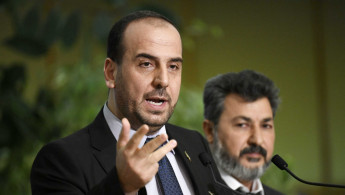Opposition negotiator condemns Homs 'terror' attack, regime vows retaliation
The head negotiator representing the main Syrian opposition bloc has condemned "terrorism and terrorists" at the Geneva peace talks.
Nasr al Hariri singled out both the Islamic State group and former Al Qaeda affiliate Jabhat Fateh al-Sham (JFS), following carnage in Homs on Saturday caused by suicide bombers.
"Our positions are clear in condemning terrorism and terrorists," said Hariri. "We condemn all terrorist operations committed by terrorist groups, and if what happened in Homs is a terrorist operation then my remarks are clear."
On Saturday head regime negotiator Bashar al-Jaafari had sought total condemnation for the Homs attack that also occured on Saturday and left more than 50 people including a local security chief dead.
The bomb attacks occured after fighters belonging to the al-Qaeda linked Jabhat Fateh al-Sham (JFS), battled with regime forces in intensive street fighting for almost two hours before at least two fighters self-detonated close to two Syrian regime security headquarters in the city.
"Any party who refuses to condemn these attacks today we will consider that party to be an accomplice of terrorism," said Jaafari, speaking on Saturday, promising a "reaction" to the carnage.
The Assad regime delegation in Geneva made no explicit mention of the airforce raids in east Damascus and in Hama on Saturday, which killed at least 10 people according to the UK based Syrian Observatory for Human rights.
This round of Geneva negotiations has not yet begun in earnest, while procedural matters are finalised.
The Syrian conflict began when the Baath regime, in power since 1963 led by Assad, responded with military force to peaceful protests demanding democratic reforms during the 2011 Arab Spring wave of uprisings, triggering an armed rebellion fuelled by mass defections from the Syrian army.
According to independent monitors, hundreds of thousands of civilians have been killed in the war, mostly by the regime and its powerful allies. Over 12 million - half of the country's prewar population - have also been displaced.
Talks in Geneva follow on from multilateral meetings in the Kazakh capital Astana aimed at re-inforcing a fragile nationwide truce that has struggled to hold on numerous fronts with regime and opposition figures trading accusations of violations.





 Follow the Middle East's top stories in English at The New Arab on Google News
Follow the Middle East's top stories in English at The New Arab on Google News
![The UAE is widely suspected of arming the RSF militia [Getty]](/sites/default/files/styles/image_330x185/public/2024-11/GettyImages-472529908.jpg?h=69f2b9d0&itok=Yauw3YTG)
![Netanyahu furiously denounced the ICC [Getty]](/sites/default/files/styles/image_330x185/public/2024-11/GettyImages-2169352575.jpg?h=199d8c1f&itok=-vRiruf5)
![Both Hamas and the Palestinian Authority welcomed the ICC arrest warrants [Getty]](/sites/default/files/styles/image_330x185/public/2024-11/GettyImages-2178351173.jpg?h=199d8c1f&itok=TV858iVg)